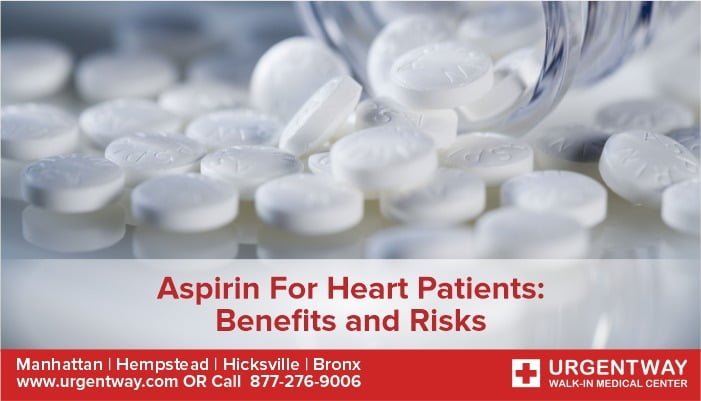Aspirin is a drug used to treat pain, headaches and fever. But hardly, you’ve heard that aspirin for heart patients is also effective and prevents heart attack. Aspirin is a blood thinner that prevents stroking by making it harder for platelets in the blood to clot. Blood clots are a vital part of our circulatory system because when you’re wounded, these blood clots prevent excess blood loss. But these blood clots become dangerous when they block the flow of blood to the heart. This condition is more common in those people who are suffering from high blood pressure or high cholesterol. So, if you’ve risk factors for blood clotting, your doctor can prescribe you aspirin as a thinner.
Can taking an aspirin help during a heart attack?
Aspirin for heart patients acts as a blood thinner and lessens the damage at that time. A small dose of aspirin is enough to stop or slow down the formation of blood clotting. The recommended dose of aspirin for heart patients is 160-326 milligrams. But it’s not effective for everyone; you should not take it if you have an allergy to aspirin.
Can taking aspirin every day help to lower your risk for a heart attack?
Intake of aspirin for heart patients every day lowers the risk of a heart attack. But for everyday use, the aspirin recommended dose is 75-81 milligrams. It would be best if you don’t take it daily without concerning your doctor.
How many ways of daily aspirin therapy?
Daily aspirin therapy may be used in two ways:
i. Primary prevention
This means you have never experienced a heart attack, bypass surgery, blocked arteries, coronary angioplasty or stent placement. Instead, you are taking aspirin to prevent these heart events.
ii. Secondary prevention
This implies that you have already experienced a heart attack or other heart disease, so you’re taking aspirin to lower heart attack damage.
What are the benefits of taking aspirin daily?
Aspirin is a common drug that is used to relieve minor pains and fever. It is found from many studies that daily intake of aspirin prevents certain cancers. When we take aspirin daily to prevent heart attack, it can give some more benefits, as shown below:
- It can relieve mild to moderate pain and swelling.
- It can treat headaches, flu, sprains and menstrual cramps.
- It can be used if you’ve heart disease, diabetes, high cholesterol, or hypertension.
- It can be a part of the treatment plan if recently you had a coronary bypass, angioplasty, mini-stroke or ischemic stroke.
- Further, it can treat rheumatoid arthritis and inflammatory joint conditions.
What are the risks of taking aspirin every day?
Like all other drugs, aspirin causes some side effects with benefits. It mainly causes excessive bleeding in the stomach and brain, kidney failure and hemorrhagic stroke. Some more common side-effects of aspirin for heart patients are:
- Indigestion
- Gut irritation
- Nausea
- Vomiting
- Bruising
- Stomach bleeding
- Vomiting
- Worsening asthma
- Stomach inflammation
- Arteries infection
What are the risk factors for the complications associated with aspirin?
You might have more side effects and complications of aspirin if you’re
- Allergic to aspirin
- Have a clotting disorder
- Have stomach ulcer
- Drink alcohol regularly
- Are over the age of 70
- Need to undergo a medical procedure
What are the complications of aspirin for heart patients?
There are the following complications of aspirin for heart patients:
i. Stroke caused by a burst blood vessel
While taking aspirin regularly may help reduce clot-related strokes. But, it can also raise the chance of a bleeding stroke (hemorrhagic stroke).
ii. Bleeding in the intestines
The use of aspirin daily raises the chance of getting a stomach ulcer. If you already have a bleeding ulcer or gastrointestinal bleeding, taking aspirin might make it worse, perhaps can lead to death.
iii. Allergic reaction
If you have an aspirin allergy, any dose of aspirin might cause a severe allergic response.
Aspirin is a drug not only used to relieve pain. Instead, it is also beneficial for heart patients. Aspirin for heart patients acts as a thinner to stop the clotting of blood to the heart. Aspirin for heart patients is recommended for daily use so that desirable benefits can be obtained. It lowers the risks of heart attack and can be a part of the treatment plan in angioplasty or heart surgery. It has many benefits and can treat multiple diseases, but unfortunately, it has side effects, such as irritation, digestive problems, or inflammation. But, overall, it is most effective to treat heart attack and prevent other heart diseases such as stroke, Marfan syndrome, or thrombosis.



